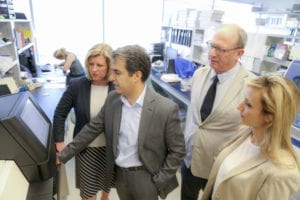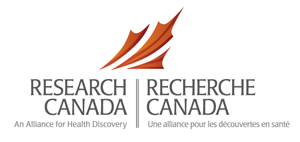 With the discovery of BRCA1 and BRCA2, the genes linked to hereditary breast cancer, there was an urgent need for healthcare providers to also understand the clinical implications of a positive mutation diagnosis. Research identified a heightened risk for breast and ovarian cancer for BRCA mutation carriers, however there was little information on how to counsel patients on what it meant in terms of prevention and treatment options. The Familial Breast Cancer Research Unit (FBCRU) at Women’s College Hospital is focused on closing this gap to prevent hereditary cancer from developing, diagnosing it early and treating it more effectively in patients who carry these mutations.
With the discovery of BRCA1 and BRCA2, the genes linked to hereditary breast cancer, there was an urgent need for healthcare providers to also understand the clinical implications of a positive mutation diagnosis. Research identified a heightened risk for breast and ovarian cancer for BRCA mutation carriers, however there was little information on how to counsel patients on what it meant in terms of prevention and treatment options. The Familial Breast Cancer Research Unit (FBCRU) at Women’s College Hospital is focused on closing this gap to prevent hereditary cancer from developing, diagnosing it early and treating it more effectively in patients who carry these mutations.
The FBCRU team, comprised of scientists Drs. Steven Narod, Kelly Metcalfe, Mohammad Akbari and Joanne Kotsopoulos, has developed the largest known database of North American women with hereditary cancer, including pathology and treatment. Their research aims to identify gaps in hereditary cancer research that have significant impact on patients’ experiences and outcomes.
Genetic testing has improved immensely in both quality and speed, allowing healthcare providers to share valuable information with women before they need to make decisions around surgery and treatment. The team is currently investigating how knowledge of a BRCA mutation at the time of breast cancer diagnosis could influence decision-making, as women with a BRCA mutation are more likely to choose to undergo preventative surgical options to minimize their risk. The team’s previous research has shown that bilateral mastectomy and oophorectomy, as a treatment for breast cancer, can reduce the risk of dying by half.
Additionally, the scientists are studying the benefits of population-based genetic testing through various research initiatives. By identifying individuals at high risk of hereditary cancer, patients have increased access to screening to detect and treat their cancer at a smaller, more treatable stage. With this knowledge, patients and their healthcare providers can also have informed discussions about prophylactic treatments such as mastectomy and oophorectomy to reduce their risk of cancer completely – preventing cancer before it starts.
